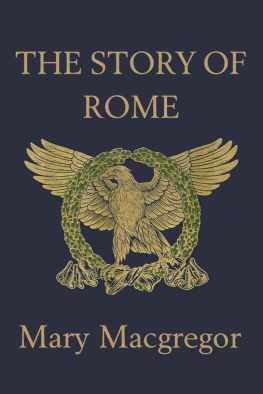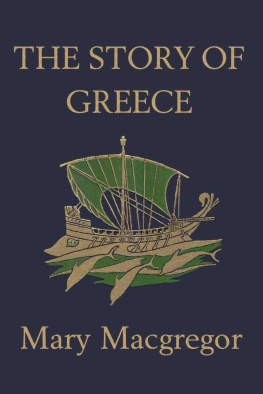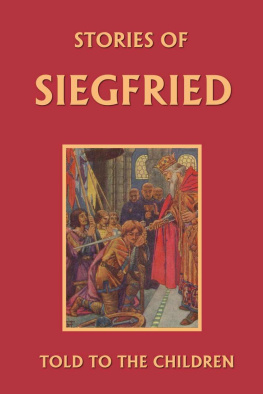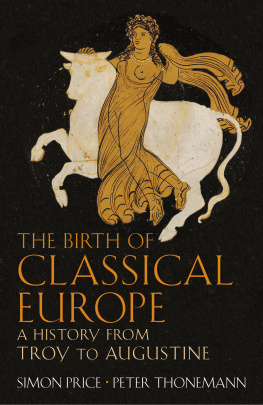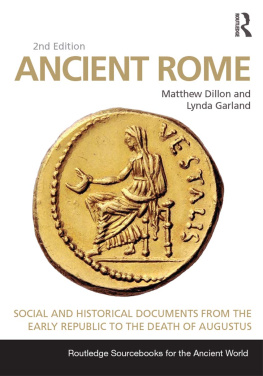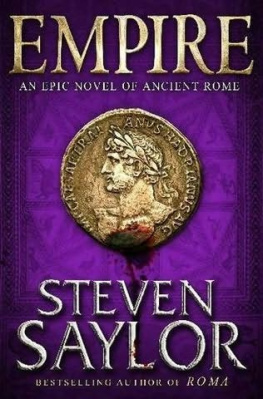Mary Macgregor - The Story of Rome
Here you can read online Mary Macgregor - The Story of Rome full text of the book (entire story) in english for free. Download pdf and epub, get meaning, cover and reviews about this ebook. year: 2006, publisher: Yesterdays Classics, genre: History. Description of the work, (preface) as well as reviews are available. Best literature library LitArk.com created for fans of good reading and offers a wide selection of genres:
Romance novel
Science fiction
Adventure
Detective
Science
History
Home and family
Prose
Art
Politics
Computer
Non-fiction
Religion
Business
Children
Humor
Choose a favorite category and find really read worthwhile books. Enjoy immersion in the world of imagination, feel the emotions of the characters or learn something new for yourself, make an fascinating discovery.
- Book:The Story of Rome
- Author:
- Publisher:Yesterdays Classics
- Genre:
- Year:2006
- Rating:4 / 5
- Favourites:Add to favourites
- Your mark:
- 80
- 1
- 2
- 3
- 4
- 5
The Story of Rome: summary, description and annotation
We offer to read an annotation, description, summary or preface (depends on what the author of the book "The Story of Rome" wrote himself). If you haven't found the necessary information about the book — write in the comments, we will try to find it.
The Story of Rome — read online for free the complete book (whole text) full work
Below is the text of the book, divided by pages. System saving the place of the last page read, allows you to conveniently read the book "The Story of Rome" online for free, without having to search again every time where you left off. Put a bookmark, and you can go to the page where you finished reading at any time.
Font size:
Interval:
Bookmark:
All rights reserved. No part of this book may be reproduced or retransmitted in any form or by any means without the written permission of the publisher.
This edition, first published in 2010 by Yesterday's Classics, an imprint of Yesterday's Classics, LLC, is an unabridged republication of the work originally published by Frederick A. Stokes Company, in 1912. This title is available in a print edition (ISBN 978-1-59915-034-5).
Yesterday's Classics republishes classic books for children from the golden age of children's literature, the era from 1880 to 1920. Many of our titles are offered in high-quality paperback editions, with text cast in modern easy-to-read type for today's readers. The illustrations from the original volumes are included except in those few cases where the quality of the original images is too low to make their reproduction feasible. Unless specified otherwise, color illustrations in the original volumes are rendered in black and white in our print editions.
D EAR I AN AND W ILLIE,The Story of Rome has been written, as you know, in your beautiful, quiet old garden.
And as the story grew, the short cold days of winter passed and the long warm days of summer were here.
In the garden a miracle had been wrought. It had become alive.
After slow, persistent struggle with storm and frost, the delicate bare branches were no longer bare, but clothed in living green. The hard black earth too had stirred, and shoots and blades appeared, until at length the garden was ablaze with gold, purple, crimson.
Sometimes I dreamed that, in its own different way, the Story of Rome too was a miracle, wrought out of the tears and throes of a brave and ambitious people.
For the story tells of the birth of a city and of its growth through storm and struggle, until it became a great world empire.
The city which Romulus founded was built upon a single hill; soon seven hills were not great enough to contain her. And when Augustus, the first Emperor of Rome, began to reign, part of Europe, Asia Minor, Egypt, Syria, and a large portion of Africa formed his kingdom.
Although the story was written in the quiet of your garden, little of its peace has stolen into the tale, and for that you boys may care for it the more.
As you read, fierce battle-cries will ring in your ears, and the clash of arms will startle you. You will hear the tramp of armies marching to new lands to conquer them and their treasures for Rome, the city of their love.
Sometimes you will catch your breath in horror as you read of terrible and cruel deeds, for the Romans were often pitiless, showing little mercy to those they conquered.
But at other times your breath will come quick with wonder as you read of the dauntless courage, the rare endurance of these mighty men of old.
And if there are many things which you do not admire in the people of Rome, yet they possess one virtue which you and every British boy and girl may not only admire, but gladly imitate.
What that virtue is I will leave you to find out for yourselves as you read The Story of Rome .Yours affectionately,
MARY MACGREGOR
L ONG, long years ago, Troy, one of the great cities in Asia Minor, was taken by the Greeks.
Many mighty Trojans had defended their city well, and among them all none had fought more bravely than the prince neas.
But when neas saw that the Greeks had set fire to the city, he fled, carrying, it is said, his father on his shoulders, and grasping by the hand his son Ascanius.
Moreover, so precious to him was the sacred image of the goddess Pallas, that he saved it from the burning city.
The gods, pleased with his reverence, helped him in his flight by building a ship. So when neas reached the sea he at once embarked in it, with his followers and their wives, and sailed away to seek for a new land in which to build a new city.
As the Trojans sailed they saw a bright star shining above them. Day and night the star was always to be seen, showing the seafarers the direction in which to steer.
At length the Trojans reached the western shore of Italy, and here, at a town called Latium, they disembarked.
The women were weary of the sea, and no sooner had they landed than they began to wonder how they could persuade their husbands to journey no farther, but to settle in the pleasant country which they had reached.
Among these women was a lady of noble birth, who was wise as she was good.
Roma, for that was the lady's name, proposed that they should burn the ship in which they had sailed. Then it would be impossible for their husbands to go any farther in search of a new home.
The other women agreed to Roma's daring plan, and with mingled hope and fear the ship was set on fire.
When the men saw the flames devouring the vessel they were troubled, but when they found out how it had been set on fire, they were angry.
Yet, as anger could not give them back their ship, and as Italy was a pleasant land, the men did as the women wished. They settled near a hill called Mount Palatine, and there they built a city.
Some old stories tell that the city was called Rome after Roma, the noble lady who had first thought of setting the ship on fire.
But other stories say that the country in which neas landed belonged to a king named Latinus, who welcomed the Trojan, and gave him ground on which to build. neas married Lavinia, the daughter of the king, and called the city which he built after her Lavinium.
Soon after this, King Latinus was killed in battle, and then for three years neas ruled well and wisely not only over his own Trojan followers, but also over the subjects of his royal father-in-law. His people he now called Latins, in memory of King Latinus.
When the three years were passed, war broke out against the Etruscans, who were at that time the most powerful tribe in Italy.
One day a terrible storm overtook the armies on the battlefield; so dark grew the clouds that the soldiers could not see each other.
When at length the sky cleared neas had disappeared, and was seen no more on earth.
"The gods have taken him away," said the Latins. So they built an altar, and henceforth worshipped their king as the god Jupiter.
Ascanius, who had escaped from Troy with his father, now ruled in Lavinium. But he soon found that the city was not large enough for all his people; so, leaving Lavinium, he built a new city, and called it Alba Longa, or the Long White City.
Alba Longa stood in the midst of the Alban hills, not far from the site on which Rome itself was soon to be built.
A FTER the death of Ascanius nearly three hundred years passed away, and then a king named Proca died, leaving behind him two sons. The name of the elder was Numitor, the name of the younger Amulius.
The crown belonged by right to Numitor, the elder son, but Amulius, who was ambitious, was not willing that his brother should reign. So he said to Numitor, "One of us shall wear the crown, and to the other shall belong the gold and treasures left by our father Proca."
The story does not tell if Numitor was indignant with his brother, and said that the crown belonged to him; it only tells that Numitor chose to reign, as was indeed his right.
Font size:
Interval:
Bookmark:
Similar books «The Story of Rome»
Look at similar books to The Story of Rome. We have selected literature similar in name and meaning in the hope of providing readers with more options to find new, interesting, not yet read works.
Discussion, reviews of the book The Story of Rome and just readers' own opinions. Leave your comments, write what you think about the work, its meaning or the main characters. Specify what exactly you liked and what you didn't like, and why you think so.

